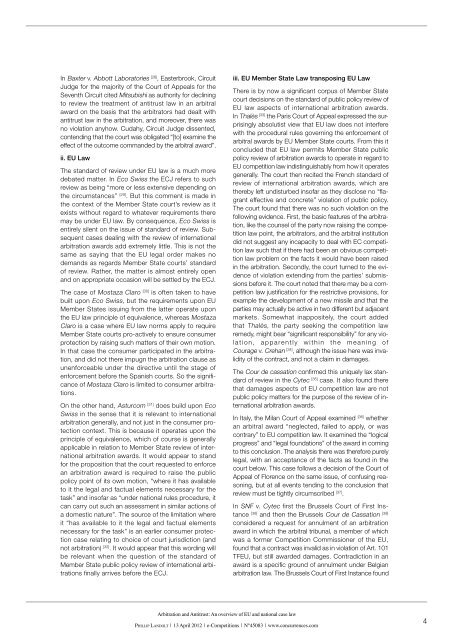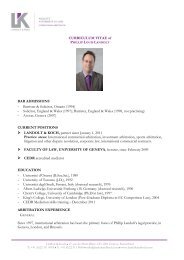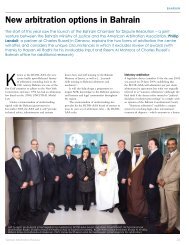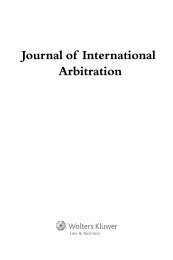Arbitration and Antitrust An overview of EU and national case law
Arbitration and Antitrust: An overview of EU and ... - Landolt & Koch
Arbitration and Antitrust: An overview of EU and ... - Landolt & Koch
- No tags were found...
Create successful ePaper yourself
Turn your PDF publications into a flip-book with our unique Google optimized e-Paper software.
In Baxter v. Abbott Laboratories [28] , Easterbrook, Circuit<br />
Judge for the majority <strong>of</strong> the Court <strong>of</strong> Appeals for the<br />
Seventh Circuit cited Mitsubishi as authority for declining<br />
to review the treatment <strong>of</strong> antitrust <strong>law</strong> in an arbitral<br />
award on the basis that the arbitrators had dealt with<br />
antitrust <strong>law</strong> in the arbitration, <strong>and</strong> moreover, there was<br />
no violation anyhow. Cudahy, Circuit Judge dissented,<br />
contending that the court was obligated “[to] examine the<br />
effect <strong>of</strong> the outcome comm<strong>and</strong>ed by the arbitral award”.<br />
ii. <strong>EU</strong> Law<br />
The st<strong>and</strong>ard <strong>of</strong> review under <strong>EU</strong> <strong>law</strong> is a much more<br />
debated matter. In Eco Swiss the ECJ refers to such<br />
review as being “more or less extensive depending on<br />
the circumstances” [29] . But this comment is made in<br />
the context <strong>of</strong> the Member State court’s review as it<br />
exists without regard to whatever requirements there<br />
may be under <strong>EU</strong> <strong>law</strong>. By consequence, Eco Swiss is<br />
entirely silent on the issue <strong>of</strong> st<strong>and</strong>ard <strong>of</strong> review. Subsequent<br />
<strong>case</strong>s dealing with the review <strong>of</strong> inter<strong>national</strong><br />
arbitration awards add extremely little. This is not the<br />
same as saying that the <strong>EU</strong> legal order makes no<br />
dem<strong>and</strong>s as regards Member State courts’ st<strong>and</strong>ard<br />
<strong>of</strong> review. Rather, the matter is almost entirely open<br />
<strong>and</strong> on appropriate occasion will be settled by the ECJ.<br />
The <strong>case</strong> <strong>of</strong> Mostaza Claro [30] is <strong>of</strong>ten taken to have<br />
built upon Eco Swiss, but the requirements upon <strong>EU</strong><br />
Member States issuing from the latter operate upon<br />
the <strong>EU</strong> <strong>law</strong> principle <strong>of</strong> equivalence, whereas Mostaza<br />
Claro is a <strong>case</strong> where <strong>EU</strong> <strong>law</strong> norms apply to require<br />
Member State courts pro-actively to ensure consumer<br />
protection by raising such matters <strong>of</strong> their own motion.<br />
In that <strong>case</strong> the consumer participated in the arbitration,<br />
<strong>and</strong> did not there impugn the arbitration clause as<br />
unenforceable under the directive until the stage <strong>of</strong><br />
enforcement before the Spanish courts. So the significance<br />
<strong>of</strong> Mostaza Claro is limited to consumer arbitrations.<br />
On the other h<strong>and</strong>, Asturcom [31] does build upon Eco<br />
Swiss in the sense that it is relevant to inter<strong>national</strong><br />
arbitration generally, <strong>and</strong> not just in the consumer protection<br />
context. This is because it operates upon the<br />
principle <strong>of</strong> equivalence, which <strong>of</strong> course is generally<br />
applicable in relation to Member State review <strong>of</strong> inter<strong>national</strong><br />
arbitration awards. It would appear to st<strong>and</strong><br />
for the proposition that the court requested to enforce<br />
an arbitration award is required to raise the public<br />
policy point <strong>of</strong> its own motion, “where it has available<br />
to it the legal <strong>and</strong> factual elements necessary for the<br />
task” <strong>and</strong> ins<strong>of</strong>ar as “under <strong>national</strong> rules procedure, it<br />
can carry out such an assessment in similar actions <strong>of</strong><br />
a domestic nature”. The source <strong>of</strong> the limitation where<br />
it “has available to it the legal <strong>and</strong> factual elements<br />
necessary for the task” is an earlier consumer protection<br />
<strong>case</strong> relating to choice <strong>of</strong> court jurisdiction (<strong>and</strong><br />
not arbitration) [32] . It would appear that this wording will<br />
be relevant when the question <strong>of</strong> the st<strong>and</strong>ard <strong>of</strong><br />
Member State public policy review <strong>of</strong> inter<strong>national</strong> arbitrations<br />
finally arrives before the ECJ.<br />
iii. <strong>EU</strong> Member State Law transposing <strong>EU</strong> Law<br />
There is by now a significant corpus <strong>of</strong> Member State<br />
court decisions on the st<strong>and</strong>ard <strong>of</strong> public policy review <strong>of</strong><br />
<strong>EU</strong> <strong>law</strong> aspects <strong>of</strong> inter<strong>national</strong> arbitration awards.<br />
In Thalès [33] the Paris Court <strong>of</strong> Appeal expressed the surprisingly<br />
absolutist view that <strong>EU</strong> <strong>law</strong> does not interfere<br />
with the procedural rules governing the enforcement <strong>of</strong><br />
arbitral awards by <strong>EU</strong> Member State courts. From this it<br />
concluded that <strong>EU</strong> <strong>law</strong> permits Member State public<br />
policy review <strong>of</strong> arbitration awards to operate in regard to<br />
<strong>EU</strong> competition <strong>law</strong> indistinguishably from how it operates<br />
generally. The court then recited the French st<strong>and</strong>ard <strong>of</strong><br />
review <strong>of</strong> inter<strong>national</strong> arbitration awards, which are<br />
thereby left undisturbed ins<strong>of</strong>ar as they disclose no “flagrant<br />
effective <strong>and</strong> concrete” violation <strong>of</strong> public policy.<br />
The court found that there was no such violation on the<br />
following evidence. First, the basic features <strong>of</strong> the arbitration,<br />
like the counsel <strong>of</strong> the party now raising the competition<br />
<strong>law</strong> point, the arbitrators, <strong>and</strong> the arbitral institution<br />
did not suggest any incapacity to deal with EC competition<br />
<strong>law</strong> such that if there had been an obvious competition<br />
<strong>law</strong> problem on the facts it would have been raised<br />
in the arbitration. Secondly, the court turned to the evidence<br />
<strong>of</strong> violation extending from the parties’ submissions<br />
before it. The court noted that there may be a competition<br />
<strong>law</strong> justification for the restrictive provisions, for<br />
example the development <strong>of</strong> a new missile <strong>and</strong> that the<br />
parties may actually be active in two different but adjacent<br />
markets. Somewhat inappositely, the court added<br />
that Thalès, the party seeking the competition <strong>law</strong><br />
remedy, might bear “significant responsibility” for any viol<br />
a t i o n , a p p a re n t l y w i t h i n t h e m e a n i n g o f<br />
Courage v. Crehan [34] , although the issue here was invalidity<br />
<strong>of</strong> the contract, <strong>and</strong> not a claim in damages.<br />
The Cour de cassation confirmed this uniquely lax st<strong>and</strong>ard<br />
<strong>of</strong> review in the Cytec [35] <strong>case</strong>. It also found there<br />
that damages aspects <strong>of</strong> <strong>EU</strong> competition <strong>law</strong> are not<br />
public policy matters for the purpose <strong>of</strong> the review <strong>of</strong> inter<strong>national</strong><br />
arbitration awards.<br />
In Italy, the Milan Court <strong>of</strong> Appeal examined [36] whether<br />
an arbitral award “neglected, failed to apply, or was<br />
contrary” to <strong>EU</strong> competition <strong>law</strong>. It examined the “logical<br />
progress” <strong>and</strong> “legal foundations” <strong>of</strong> the award in coming<br />
to this conclusion. The analysis there was therefore purely<br />
legal, with an acceptance <strong>of</strong> the facts as found in the<br />
court below. This <strong>case</strong> follows a decision <strong>of</strong> the Court <strong>of</strong><br />
Appeal <strong>of</strong> Florence on the same issue, <strong>of</strong> confusing reasoning,<br />
but at all events tending to the conclusion that<br />
review must be tightly circumscribed [37] .<br />
In SNF v. Cytec first the Brussels Court <strong>of</strong> First Instance<br />
[38] <strong>and</strong> then the Brussels Cour de Cassation [39]<br />
considered a request for annulment <strong>of</strong> an arbitration<br />
award in which the arbitral tribunal, a member <strong>of</strong> which<br />
was a former Competition Commissioner <strong>of</strong> the <strong>EU</strong>,<br />
found that a contract was invalid as in violation <strong>of</strong> Art. 101<br />
TF<strong>EU</strong>, but still awarded damages. Contradiction in an<br />
award is a specific ground <strong>of</strong> annulment under Belgian<br />
arbitration <strong>law</strong>. The Brussels Court <strong>of</strong> First Instance found<br />
<strong>Arbitration</strong> <strong>and</strong> <strong><strong>An</strong>titrust</strong>: <strong>An</strong> <strong>overview</strong> <strong>of</strong> <strong>EU</strong> <strong>and</strong> <strong>national</strong> <strong>case</strong> <strong>law</strong><br />
PHILLIP LANDOLT l 13 April 2012 l e-Competitions l N°45083 l www.concurrences.com<br />
4





